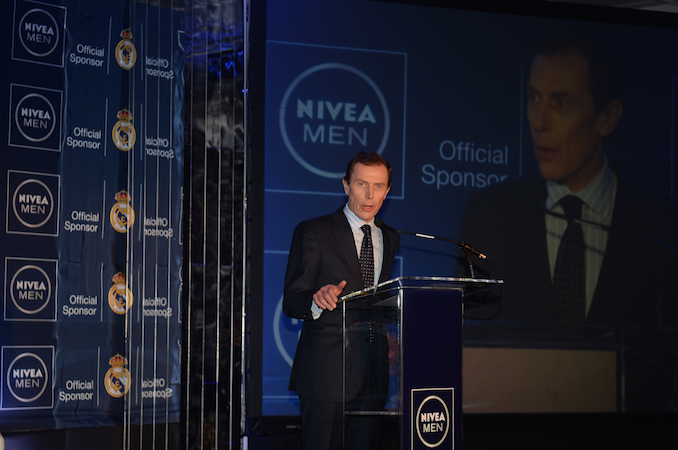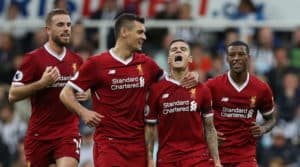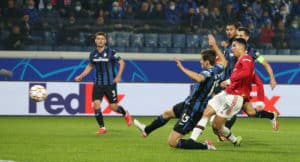Foreign teams are now in the forefront of loyal fans’ thinking – and this has brought new sponsorships into the country, writes GEORGE DEARNALEY in Sport Monthly magazine.
It wasn’t a million years ago that the top European teams and their superstar players seemed like a different galaxy to local fans. I remember, growing up as a kid in Durban, that we got to watch an English First Division highlights video one week after the action had taken place. Back then it was considered a privilege, almost as if we were watching the match ‘live’, and getting all excited about what we were seeing.
The only other way to stay up to date with the latest news coming out of England was by buying Shoot! magazine every month – and that also came with its own complications, with it taking ages to arrive in the post. There was no mention of Italy’s Serie A or the German Bundesliga. Precious few ever mentioned the Spanish La Liga, and the European Cup competitions were only something to talk about if a popular English team got to the final. There was also a patch in the mid- 1980s when the English teams getting to the final were Aston Villa and Nottingham Forest, and supporters of those clubs were thin on the ground in South Africa. Inevitably, the continental final passed by largely unnoticed.
But the rise of satellite television saw an increase in awareness and support of European football teams across Africa. SuperSport’s coverage of the Premier League saw a dramatic increase in English football supporters, not only of the traditional big four – Manchester United, Tottenham, Liverpool and Arsenal – but also the likes of Everton, Chelsea, Manchester City and anyone playing against Manchester United over the past 20 years. Kids at local schools could suddenly speak confidently about West Ham’s attacking players, or the defensive frailties at Newcastle. We all became experts.
This was followed by more coverage of the Champions League and by the Uefa Cup/Europa League and extended coverage of the Bundesliga, Serie A and La Liga. During the past few seasons, we have had so much television exposure to the top European teams and players that there are very few local football fans who feel they can’t speak confidently on the advantages of Pep Guardiola’s possession-based attacking game, or the disadvantages of Louis van Gaal’s slow buildup philosophy.
Jurgen Klopp is another coach who has earned many admirers in South Africa, firstly during his time at Dortmund and now with Liverpool. The top coaches and their philosophies and tactical formations are the subjects of common banter among locals. The Barcelona versus Real Madrid rivalry, once limited to Spanish football fans only, is now extended across the globe as the disciples of Lionel Messi challenge the Cristiano Ronaldo sect, and bludgeon each other with facts and stats over social media, each seeking a new record to impose their superiority over the other.
Social media has played an enormous role in extending the awareness of these European teams and their superstar players, and the access we now have to players, who were once only figments of our imagination, borders on stalker material. You can follow Ronaldo on Twitter, as one of his 43 million fans – or find out what Messi had for breakfast via his official Facebook page, which has a ‘mere’ 84 million ‘likes’. We can access them from our living rooms, our bedrooms or bathrooms on a daily basis. We can reach them, we can tell them what we think of them, send them images of ourselves wearing their replica jerseys, we can ask for autographs and we can do it instantly. Football media coverage has come a long way.
The problem for local football is that it is now competing with the top European teams and players for support. I don’t mean the support you have for them in your heart … I refer to the support you show by actually attending a live match and shouting for your team. Local attendances have dwindled, apart from the Soweto Derby – although the last time the giants played the stadium was more half empty than half full – and it is common to get less than a couple of thousand paying customers at most PSL matches.
Everyone seems to have a solution but the reality is that the local game is competing with the best football in the world and until we can produce a generation of players who can entertain and perform at a level equal to or better than the top teams in Europe, local football is going to suffer.
There are thousands of young kids in SA running around with Messi or Ronaldo replica jerseys, but very few with the local equivalent. Chiefs and Pirates replicas are still plentiful but so too are Liverpool, United, Arsenal, Real Madrid and Barcelona shirts. The global village has provided its citizens with opportunities to support teams from miles away and deliver their superstars into their hands.
Manchester United fans watching in Cape Town
This has now opened up another door – commercialisation. Previously there was no relevance for a local business or brand to endorse a team or a player from overseas. I say ‘no relevance’ because it was intangible to the local consumer. The teams had little exposure in South Africa and although there was interest, it was purely emotional and not connected to any purchasing power that any of those fans may have had.
They may have sponsored the moon for all we cared because we were never going to be in attendance. In the past few years the amount of club merchandise has gone through the roof – you can get an Arsenal duvet, a Manchester United towel, Liverpool underpants and a Real Madrid tracksuit in the blink of an eye. The fashion items have also increased dramatically as the big sports brands compete for the hearts and minds of the younger football fans.
The 2010 Fifa World Cup gave all of South Africa a glimpse of the commercial power of the world’s most popular sport. The big sponsors were splashed across every available billboard, inviting you to drive their products or eat them or wear them or drink them. The world’s star players featured in a range of adverts across every media platform, endorsing brands, products and services that made you take notice of them because they were involved in football. These days, local brands and business units of international brands are beginning to make the most of the opportunity to partner with the world’s top teams and star players because there is now so much relevance to the market. Heineken have done a fabulous job locally of promoting their association with the Champions League.
Their television commercials are some of the best in the business, their activations use international football legends, making them all the more relevant to the market, and there are very few football fans to be found anywhere who don’t associate Heineken with the Champions League. You only >have to think of the theme song to the Champions League – odds are it will come to mind immediately – and you can mentally visualise the advert. Awareness of advertising and consideration of purchase are two of the criteria marketers use to gauge whether their sponsorship is working. I buy Heineken because they sponsor a tournament that I hold close to my heart and their advertising speaks to me. They are in tune with our passion for the game and their material is entertaining and highly relevant.
Deco in action during the Uefa Champions League Trophy Tour on 30 March in Sao Paulo

Another brand that is making the most of a global football partnership is Nivea Men South Africa.
The No 1 brand in men’s grooming products recently announced its local sponsorship of Spanish giants Real Madrid. But it is no average long- distance relationship. Their sponsorship rights package includes tickets to the ‘Real Madrid experience’ that includes a tour of the Bernabeu Stadium, the trophy room, the dressing rooms and the stadium restaurant, and tickets to home matches, as well as opportunities to visit the training facility at Valdebebas outside the city and watch the club superstars put through their paces by coach Zinedine Zidane. You can also win signed memorabilia and be a part of the growing family of Real Madrid fans in South Africa.
Emilio Butragueno, club legend and scorer of 123 goals in a 12-year career, was the special guest at the launch event. He reckons the Nivea Men partnership is the ideal platform for Real Madrid to reach out to local fans. ‘Real Madrid belongs to everybody. That’s why it is important for us to choose partners that are going to make us stronger and fulfil the dreams of millions of fans all over the world. We would like to connect to everybody’s heart.’
Kerstin Bird, the marketing director of Beiersdorf South Africa, says football is a great emotional driver for products and brands. ‘In South Africa, football is a great passion and has a fanatical following, and is an ideal platform for us to build a stronger engagement with South African men.’
That is the key message: Connecting to the heart of football fans. Anyone who has done commercial business in the football market will
tell you to never talk down to the fans. Don’t underestimate loyalty and passion, and never abuse it. Give the fans what they want and you will then tap into the loyalty and passion of people who will spend money following their teams through thick and thin.
Don’t just put your logo on the jersey. Show you care about the team and the fans. Add value to the lives of the fans. You have to earn their trust and their loyalty. But if you can crack this, the rewards are fantastic. Thousands of passionate customers will support your business.
As the remarkable Frenchman Eric Cantona once said: ‘You can change your wife, you can even change your religion, but you can never change your team.’
– This article first appeared in the June issue of Sport Monthly magazine
– Dearnaley is a former Bafana Bafana footballer and is chairman of the Football Magic Foundation.
Photos: File






